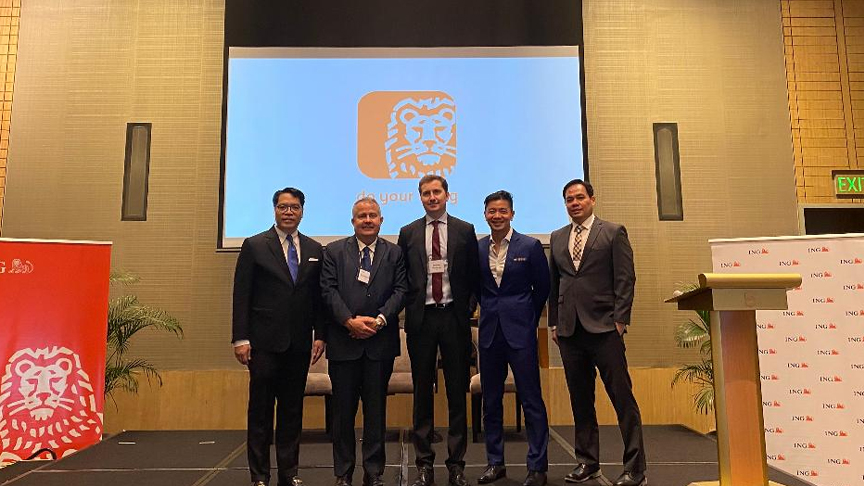ING Philippines held its annual briefing, where experts provided in-depth analysis on the current economic and geopolitical landscape. The event offered valuable insights to investors and industry stakeholders navigating the complex and dynamic market environment.
Leading the session were Rob Carnell, head of Research at ING Asia Pacific, Warren Paterson, head of Commodities Strategy at ING Asia Pacific, and Leo Tay, head of FX, Rates, and Derivatives Trading at ING Asia Pacific. Together, they delved into pressing global and regional issues, including the implications of the upcoming US elections, evolving tensions in the West Philippine Sea, and the economic impact of recent rice tariff adjustments in the Philippines.
Global Macro and Market Outlook
- Economic Slowdown: ING projects the global growth trajectory to slow down to 5.4% by the third quarter, prompting central banks, including the US Fed, to consider rate cuts of 50 basis points (bp) in time for the September Federal Open Market Committee meeting. However, inflation remains a persistent concern.
- Recession Risks: Signs of a recession are becoming more apparent as the economy slows rapidly. Despite this, financial conditions show little stress.
- Policy Rates and Asset Purchasing: The Bank of Japan (BoJ) has raised policy rates from 0-0.1% to 0.25%, with potential for further increases. China’s policy stance has also turned more supportive, with significant fiscal and monetary measures like a 7-day reverse repo rate of 10bp being implemented, but growth remains at 5% this year.
Philippines Economic Outlook
- FX Performance: The Philippine peso has improved on a quarterly basis to align with other Southeast Asian currencies. Carnell also shared that the peso will also one of the more responsive Asian currencies to shift to the Japanese yen, which could impact performance against dollar-yen.
- BSP Rate Cuts: The Bangko Sentral ng Pilipinas (BSP) is expected to start easing rates soon from 6.5%, possibly ahead of the Fed. While inflation remains high, it is largely driven by rice prices (50%), which are anticipated to drop by September.
- Opportunities and Challenges: Carnell added that the Philippines has been outperforming the region with solid foreign direct investment flows, pointing to a positive outlook from international investors. The Philippines could position itself as a key player in the “China plus one” strategy, though infrastructure limitations and geopolitical tensions pose challenges.
Energy Sector Insights
- Oil Market Dynamics: The oil market is expected to remain in deficit through 2024, with prices under pressure due to slowing demand and increased speculative outflows of USD 70 billion from global commodity markets. Oil demand in China also is softer which is a concern given China is expected to make up almost 60% of global oil demand growth.
- Supply: Despite OPEC+ production cuts, the market appears resilient to geopolitical tensions and risks. OPEC could start bringing back 2 million barrels per day (b/d) of supply to the market by Q4 2024 to 2025. However, according to Patterson, non-OPEC supply continues to grow driven by the Americas at USD 1.2 million b/d.
- Oil Prices: Oil prices are forecast to peak in the current quarter at an average of USD 86 with a potential of trending lower through 2025 at USD 79 per barrel.
- Global LNG Market: The Liquefied Natural Gas (LNG) market is projected to shift into a surplus, with significant capacity additions in both import and export terminals globally. The Philippines, in particular, is facing a declining domestic gas supply and energy transition will lead to potential imports of 8 billion cubic meters of LNG by 2030 to replace Malampaya and sustain growth and energy demand. The Philippines is also set to invest deeply in its LNG regasification capacity, with several new terminals coming online by 2025.
Geopolitical Considerations
- US Elections and Iranian Oil Supply: The upcoming US elections could have a significant impact on Iranian oil supply, depending on the outcome. A Harris victory would likely maintain the current trend, while a Trump win could lead to stricter sanctions and reduce Iranian output.
“The Philippines offers significant opportunities for investors, but it’s essential to understand the complexities of the local and global economies,” said Rob Carnell, head of Research at ING APAC. “Our briefing aims to provide actionable insights to help businesses and individuals make informed decisions, and I believe the insights shared at this session will equip investors with the necessary knowledge to navigate the complex investment landscape.”









































































































